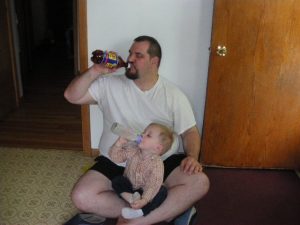 It’s a Saturday evening, and Sabbath is over. I’m still thinking about what my husband preached today from Hebrews 5:11-14. I would directly upload his teaching audio here, because it was oh, so good, but after he was done, we found out that the battery on his portable microphone died sometime today, and nothing at all was recorded. Cry!
It’s a Saturday evening, and Sabbath is over. I’m still thinking about what my husband preached today from Hebrews 5:11-14. I would directly upload his teaching audio here, because it was oh, so good, but after he was done, we found out that the battery on his portable microphone died sometime today, and nothing at all was recorded. Cry!
So with his permission, I’m going to attempt to write down what he taught today, reproduced from my meager notes in my journal.
First of all, he’s been teaching from the book of Hebrews for many weeks now, slowly chewing through the verses phrase by phrase. Through it all, he has been trying to fix our attention on Yeshua, our great high priest after the order of Melchizedek, our Messiah, our King who is in every way superior to anyone and anything else. It has been so good!
But today… screeching halt… slam on the brakes… as the writer of Hebrews changes his tone completely and lets us all down, hard, to the ground with these scathing words:
“And having been perfected, [Yeshua] became the author of eternal salvation to all who obey Him, called by God as High Priest “according to the order of Melchizedek,” of whom we have much to say, and hard to explain, since you have become dull of hearing” (Hebrews 5:9-11).
The writer says, “I could go on and tell you more about our wonderful Messiah — but I can’t. It’s too hard to explain. You just don’t seem to be listening anyway.”
What?!
Yes, I’m listening! Please teach me more! I want to learn more! I want someone to teach me, so I can grow and grow and grow!
“For though by this time you ought to be teachers, you need someone to teach you again the first principles of the oracles of God; and you have come to need milk and not solid food” (Hebrews 5:12)
Ouch!
We do have a lot of teachers in our world at this moment. We have YouTubes and websites and books and “ministries,” and for that matter, I myself record videos and write blog posts, books, Bible studies, and more. Yes, I do so under the covering of my husband, aiming my message at women and trying to be accountable to my local congregation — but I have often asked myself if I’m just adding to the noise, to the confusion. If many teachers are themselves needing milk and not solid food, then what kind of food is being served?
He had my attention this morning, that’s for sure!
We need people to teach us “again.” We need to have a chapter review before we can go on in the textbook. We need a remedial class, he says.
What is this topic that we need to relearn, even those who ought to be teachers by this time?
We need to relearn the “first principles of the oracles of God.” Just what are these oracles?
“What advantage then has the Jew, or what is the profit of circumcision? Much in every way! Chiefly because to them were committed the oracles of God” (Romans 3:1-2).
Ahhh, okay, so one hint is that the “oracles of God” were committed to the safekeeping of the Jewish people.
Paul adds more when he writes,
“Israelites, to whom pertain the adoption, the glory, the covenants, the giving of the law, the service of God, and the promises; of whom are the fathers and from whom, according to the flesh, Messiah came, who is over all, the eternally blessed God. Amen” (Romans 9:4-5).
One of the greatest treasures the world has received from the Jewish people, besides Yeshua our Messiah, is the giving of the Torah (the law). In another passage, Paul attributes all of our growth as believers to its study:
“But you must continue in the things which you have learned and been assured of, knowing from whom you have learned them, and that from childhood you have known the Holy Scriptures, which are able to make you wise for salvation through faith which is in Messiah Yeshua.
“All Scripture is given by inspiration of God, and is profitable for doctrine, for reproof, for correction, for instruction in righteousness, that the man of God may be complete, thoroughly equipped for every good work” (2 Timothy 3:14-17).
Seeing that the New Testament had not been formally compiled or fully distributed to the churches when Paul wrote this letter to Timothy, the only conclusion is that Paul is referring to the Old Testament. And the most amazing thing? The writer of Hebrews calls this “milk.”
I had never really thought about it this way. I would have thought of milk as maybe the gospel of John, or maybe some of the Psalms, or maybe Bible stories told to children in Sunday school.
However, I remember that James, at the first great council of the elders of the churches, standing before them all in Jerusalem, advised them to start new believers out by teaching them “Moses” each Sabbath day.
“Therefore I judge that we should not trouble those from among the Gentiles who are turning to God [these are the new believers],
but that we write to them to abstain from things polluted by idols, from sexual immorality, from things strangled, and from blood [these are their first steps toward holy living],
for Moses has had throughout many generations those who preach him in every city, being read in the synagogues every Sabbath” (Acts 15:19-21).
The starting point for new believers, whether Gentiles first being introduced to the God of Abraham or Jewish children being taught the Holy Scriptures from their childhood, was the same: Moses was read in the synagogues every Sabbath.
Learning what the Torah says and hearing it read each week — this is babyhood.
We aren’t supposed to stop at hearing the Torah read. If all we ever do is listen, and hear, and listen, and hear, our ears start to become dull.
“For everyone who partakes only of milk is unskilled in the word of righteousness, for he is a babe” (Hebrews 5:13).
We have to go beyond listening and actually start doing.
 At this point, my husband Kraig had a beautiful illustration that really hit me in the heart (and that’s a pun, as you’ll see).
At this point, my husband Kraig had a beautiful illustration that really hit me in the heart (and that’s a pun, as you’ll see).
In the book of 1 John, we learn the definition of sin:
“Whoever commits sin also commits lawlessness, and sin is lawlessness” (1 John 3:4).
Kraig explained that the word sin comes from the Hebrew word chatah, which means “to miss the mark.” (See Strong’s Hebrew #2403.) It is an archery word, where an arrow is shot toward a target. To sin is to miss the target. In Scriptural terms, the Torah defines the target, and to sin is to fail to hit the mark of Torah obedience in our daily lives.
In Yeshua’s time, many teachers were adding heavy burdens to the clear instructions of the written Torah of Moses, so that when the people tried to aim their arrows (so to speak) at the mark, their arms were weighed down with extra commandments of men, making it impossible for them to hit the mark. (See Matthew 23, for example.)
As the gospel went out into Gentile nations by the apostles, the problem became one of saying that no one at all needed to keep the Torah, for it had supposedly passed away. We were somehow able to just listen to the Spirit and mystically “know” what was right or wrong. It became something of every man doing what was right in his own eyes. Each man’s arms were freed of the weights of Judaism, but now the target was moving all over the place as God’s standard of righteousness was done away with.
And then there is Yeshua, the author and finisher of our faith. He kept the Torah perfectly, always — or He would never have been qualified to be our Messiah and Savior from sin. He is our teacher, and as His disciples we are to walk in His footsteps.
YHVH tells us this about His precious Torah, which by the way, is a word that simply means “instructions”:
“For this commandment which I command you today is not too mysterious for you, nor is it far off. It is not in heaven, that you should say, ‘Who will ascend into heaven for us and bring it to us, that we may hear it and do it?’ Nor is it beyond the sea, that you should say, ‘Who will go over the sea for us and bring it to us, that we may hear it and do it?’ But the word is very near you, in your mouth and in your heart, that you may do it” (Deuteronomy 30:11-14).
God says, “It’s not too hard for you! It’s not impossible for you to obey me. You don’t need some exotic teacher to come to you from heaven to explain it to you. You don’t need a special prophet from overseas to travel to you and give you permission to do what I say. No, it’s right there, written down for you in the Bible, and you can read it for yourself, and you can decide in your heart to do it.”
Of course, “all have sinned (missed the mark) and fall short of the glory of God” (Romans 3:23).
So which is it? Is it milk and easy to drink, or is it impossible for any of us, for “all have sinned”?
The writer of Hebrews answers this very question:
“But solid food belongs to those who are of full age, that is, those who by reason of use have their senses exercised to discern both good and evil” (Hebrews 5:14).
He says that keeping the Torah takes exercise. We have to aim our arrow at the mark again and again, day after day, shooting until “by reason of use” our muscles get stronger. We have to ponder the difficult passages until we have learned to discern how to do good and evil. It’s not a one-time decision. It’s a long-term habit of strengthening our archery muscles by obeying, even when we don’t feel like it.
Or, going back to the food metaphor, it’s learning to chew by exercising our jaw muscles.
Do you remember when my youngest son had a brain injury and couldn’t chew? We actually had to take him to physical therapy, where we were given little contraptions that would help him learn to chew. Then he had to practice and practice and practice. He preferred to chew towels and suck on his bottle, so we even had to teach him what things were food!




But over time, with much daily practice, he learned to chew. Now he’s a growing 8-year-old, and I can tell you that he adores hamburgers and steak and pretty much any other food in sight.
But it took practice, and it takes practice for us as well. We have to not only be hearers of the Word but doers, too, or we’ll just be deceiving ourselves (James 1:22).
“As newborn babes, desire the pure milk of the word, that you may grow thereby” (1 Peter 2:2).
It’s not always fun. In fact, when we learn that our favorite lifestyle practice is actually called a “sin” by the Torah, it is normal for us (and any young child) to feel rebellious, to whine and cry, and to think of excuses why this rule should not apply. We’ll call it legalism, perhaps, or we’ll look around to see what others are doing, in hopes of finding an excuse to stay an infant.
And in the recent Olympics, I imagine that those biathletes who ski for miles and then lie down and have perfect control of their muscles to fire a gun and hit the target almost every time, struggled when they were in training and their muscles were screaming and all their friends got to sleep in each morning rather than get up early to train at the gym. Of course it was hard! It was very hard! But… with constant use, they exercised their muscles and they learned to hit the mark.
They hit the mark by obedience to the Torah. Day after day. Big commands. Little commands. Easy things. Harder things.
And now they can go on to spiritual maturity. Their reward is an amazing steak at the best restaurant. Or a gold medal.
Or the ability to now understand prophecy, or the book of Revelation, or to pray and have close communion each day with the Father.
Or the ability to teach Scripture to our friends in a way they can easily understand.
“For though by this time you ought to be teachers, you need someone to teach you again the first principles of the oracles of God; and you have come to need milk and not solid food. For everyone who partakes only of milk is unskilled in the word of righteousness, for he is a babe. But solid food belongs to those who are of full age, that is, those who by reason of use have their senses exercised to discern both good and evil” (Hebrews 5:12-14).
“Now when the tempter came to [Yeshua], he said, ‘If You are the Son of God, command that these stones become bread.’ But He answered and said, ‘It is written, “Man shall not live by bread alone, but by every word that proceeds from the mouth of God“‘” (Matthew 4:3-4).
In the next chapter of Hebrews, we can read more about the “elementary” truths that we should be mastering. This is the easy stuff, which every believer should get down pat rather quickly.
“Therefore, leaving the discussion of the elementary principles of Messiah, let us go on to perfection, not laying again the foundation of repentance from dead works and of faith toward God, of the doctrine of baptisms, of laying on of hands, of resurrection of the dead, and of eternal judgment” (Hebrews 6:1-2).
My husband plans to review these foundational topics briefly next Sabbath, but it’s rather easy to see this is the gospel that is taught in churches across our country, week after week. We sing about these things. We read books about them. We get in trouble if we don’t talk about them enough!
But the author of Hebrews calls these milk. Spending our entire lives on the gospel alone is spending our life in babyhood. No one thinks that’s healthy, do they?
We need to go on. We need to start chewing solid food by going into the Torah and learning how to practice righteousness. Chew, chew, practice, practice, exercise, exercise, sweat a little, keep it going, you can do it.
And only then are we ready for the meat, the good stuff, Baby, which is the point where we can start to be teachers and share truth with others.
So let’s search our hearts. Is there some gristle that we’ve stuffed in our cheeks because we don’t prefer the taste and we’re tired of chewing? Are we returning to milkshakes each week? Are we doing what God’s law says, or do we just read it only?
I’m on the same growth chart you are. Take my hand! We can do this together, okay?

All Scripture in this blog post taken from the New King James Version®. Copyright © 1982 by Thomas Nelson. Used by permission. All rights reserved.

Truly blessed! Reminds me of Genesis 49- describing Judah and Yeshua- how His eyes red with wine and His teeth white with milk… the wine being what comes from the ‘choice vine’ spoken of earlier- and how wine is what comes from the fruit- the doctrine, or teaching- and how His teeth a pure white with speaking the milk of the Torah to the people- the wine being a symbol of the covenant loyalty He bled- and reminds me of the rebuke He gave earlier in the prophets about the Shepherds being drunk with the wine, and trampling the flock, so He came Himself to feed them. Our eyes should also be red from studying, fasting, praying- but when we speak we should be careful to have pure understandable and easy to digest milk that is soothing and nourishing to young ones in the faith. Thank you so much for sharing! Would be nice to hear what Mr. Elliot has been teaching in Hebrews
Thank you, Mel. This was a very beautiful symbolism!
Mr. Elliott’s teachings are posted on our fellowship’s website, but we’ve been having a lot of technical difficulties this winter. He said to tell you that we’ll try to get more posted from Hebrews asap.
http://solelsabbathfellowship.com/category/audio-teachings/
Thank you Anne so much!!!!
A newbie drinking milk n chewing meat slowly in prayer so as to share with joy !
Blessings wished from Heavenly Father YeHoVah
Sincerely
Suzanne
Thank You @brigitte_victoria
Dear Anne,
“Meeting” you online has been an inspiration and a blessing. I first came across ‘your name’ through a health article about adrenal fatigue, probably from Currclick. After reading your works for awhile, I began to suspect that maybe you were a Sabbath keeper. Finally, two years ago, I realized that you were! I have gleaned so much through the things that you share. What a blessing that our Father gifted you with your talents for writing and sharing because it blesses so many others. Father Yahweh redirected my path over 20 years ago (1995), and the learning/growing process doesn’t end. The need for review never ends. Thank you that despite being such a busy, busy mom (I have five myself), you still find a way to give, give, and give. May Yahweh always sustain you as you choose to serve Him in so many different capacities.
I really enjoyed that one. I agree 100%.